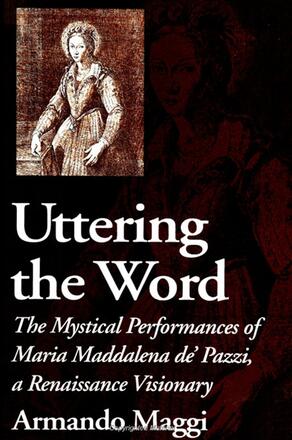
Uttering the Word
The Mystical Performances of Maria Maddalena de' Pazzi, a Renaissance Visionary
Alternative formats available from:
Employing contemporary theoretical perspectives, this book provides the first detailed analysis of the language and thought of Maria Maddalena de' Pazzi, an important but neglected Renaissance mystic.
Description
Employing contemporary theoretical perspectives, Uttering the Word provides the first detailed analysis of the language and thought of Maria Maddalena de' Pazzi (1566–1607), an important but neglected Renaissance mystic. Borrowing from Lacan, de Certeau, and Deleuze, Maggi analyzes de' Pazzi's unique mystical discourse and studies how the Florentine visionary interprets the relationship between orality and writing, authorship and audience, sexual identity and language.
Armando Maggi is Assistant Professor in the Department of Romance Languages at the University of Pennsylvania. He is also the author of Il fermo fluire del se': L'impresa rinascimentale e l'immagine della propria identita.
Reviews
"This book belongs to a line of new works that examines visionaries not from a religious but from a literary point of view. Although de' Pazzi is not technically the author of any of her published I colloqui, she 'wrote' them through intense visions that her conventual sisters transcribed and edited. The interplay of seeing (in the vision) what could hardly be said properly (in religious and lay terms) and of making readable through a grammatical, philological and theological point of view what the saint herself would hardly recognize as coming from her mouth, is elegantly caught in Maggi's weaving of his own methodology with those of Derrida, Barthes, de Certeau, and Deleuze. The result is a readable book that will introduce the English speaking public to a kind of literature that is now becoming popular: that written in convents. " — Valeria Finucci, Duke University
"Uttering the Word is a very thorough study of a visionary's words from a very contemporary theoretical perspective that does justice to the oral performance of those words, their writings by the nuns, and contemporary concerns with theory and feminist studies. Maggi's deep knowledge of the text and his expert analysis of it place this study in the forefront of Renaissance scholarship dealing with mystical writings. " — Dino S. Cervigni, University of North Carolina at Chapel Hill